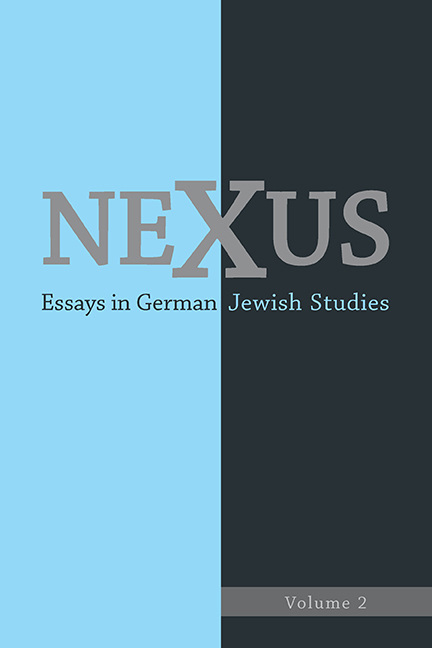Book contents
- Frontmatter
- Dedication
- Contents
- Acknowledgments
- Introduction
- Nexus Forum
- Introduction to the Nexus Forum A Most Unwanted Man: Hans-Joachim Schoeps
- Jew, Prussian, German: The Adventuresome Story of Hans-Joachim Schoeps
- Hans-Joachim Schoeps: Contrarian Scholar
- The Meyerowitz Family from Königsberg: Contemporaries of Hans-Joachim Schoeps
- From the Margins: A Response to Schoeps on Schoeps
- A Conservative Christian Welcome: A Response to Julius Schoeps
- Facing His Nazi Past? A Response to Schoeps on Schoeps
- Setting the Record Straight Regarding The Protocols of the Elders of Zion: A Fool's Errand?
- A Discussion of the “German” Dimension of Reform Judaism in Select Congregations in Three American Southern States, 1860–1880
- Weimar on Broadway: Fritz Kortner and Dorothy Thompson's Refugee Play Another Sun
- If I forget thee, O Jerusalem: The Jewish Exilic Mind in Else Lasker-Schüler's IchundIch
- “Seit ein Gespräch wir sind und hören können von einander”: Martin Buber's Message to Postwar Germany
- Hungerkünstler: George Tabori Directs Kafka in Bremen (1977)
If I forget thee, O Jerusalem: The Jewish Exilic Mind in Else Lasker-Schüler's IchundIch
from Nexus Forum
Published online by Cambridge University Press: 15 March 2018
- Frontmatter
- Dedication
- Contents
- Acknowledgments
- Introduction
- Nexus Forum
- Introduction to the Nexus Forum A Most Unwanted Man: Hans-Joachim Schoeps
- Jew, Prussian, German: The Adventuresome Story of Hans-Joachim Schoeps
- Hans-Joachim Schoeps: Contrarian Scholar
- The Meyerowitz Family from Königsberg: Contemporaries of Hans-Joachim Schoeps
- From the Margins: A Response to Schoeps on Schoeps
- A Conservative Christian Welcome: A Response to Julius Schoeps
- Facing His Nazi Past? A Response to Schoeps on Schoeps
- Setting the Record Straight Regarding The Protocols of the Elders of Zion: A Fool's Errand?
- A Discussion of the “German” Dimension of Reform Judaism in Select Congregations in Three American Southern States, 1860–1880
- Weimar on Broadway: Fritz Kortner and Dorothy Thompson's Refugee Play Another Sun
- If I forget thee, O Jerusalem: The Jewish Exilic Mind in Else Lasker-Schüler's IchundIch
- “Seit ein Gespräch wir sind und hören können von einander”: Martin Buber's Message to Postwar Germany
- Hungerkünstler: George Tabori Directs Kafka in Bremen (1977)
Summary
This article interrogates the play IchundIch (IandI) as a key work in understanding the exile of the German-Jewish writer Else Lasker-Schüler. IchundIch bears witness to the author's crisis of self after the Nazis revoked her German citizenship and extended her vacation to Jerusalem indefinitely. Written between 1940 and 1941, Lasker-Schüler's rhyming avant-garde drama uses a Faustian framework to position her thoughts on Jerusalem and Berlin, heaven and hell, the eternal and the ephemeral. Despite the ruthless use of Verfremdungseffekt (alienation effect) that keeps the audience questioning the author's motives, I argue that space, time, and fractured subjectivity are motifs throughout the play that reveal her antagonistic feelings toward her Jerusalem exile. This work marks a significant turn from her pre-exilic writings, which pushed the Zionist narrative in their effervescent idealization of the Jewish homeland. Here, rather than writing a play about a triumphant homecoming, Lasker-Schüler condemns Jerusalem to hell.
IchundIch exposes the possibility of Zionist exile in the Land of Israel. The final years of Lasker-Schüler's life in Jerusalem present a limit case for exile studies—a space where exile meets homecoming. To evaluate this German-Jewish author's experience, I employ Edward Said and his reading of Dante's Inferno as the paradigmatic exilic work. Such a reading brings out the complexities, layers, and multiple inversions in Lasker-Schüler's text, which include her engagement with Jewish modes of representation even while she denounces the Jewish holy city. I situate this lesser-known work in relation to Lasker-Schüler's pre-exilic and post-exilic writings to demonstrate her radical change of heart. Written into the lines of IchundIch is the author's pain at the disillusionment she experienced upon realizing her Zionist dream.
ELSE LASKER-SCHÜLER (1869–1945) was one of the signature products of the early twentieth-century German-Jewish cultural renaissance. Deemed by her contemporaries as “die jüdischste Dichterin” (the most Jewish poetess), Lasker-Schüler combined her involvement in the modernist Expressionist movement with a Jewish self-assertion that was unique among German authors. Orientalist, Jewish themes pervaded much of her work, most notably Hebräische Balladen (Hebrew Ballads, 1917) and Das Hebräerland (The Land of Hebrews, 1937). At the end of her life, the Zionist-influenced author left behind an archive of writings that recorded how she initially imagined, later visited, and was finally exiled to the Land of Israel. In 1933, after Lasker-Schüler was attacked in the streets of Berlin, she went into Swiss exile.
- Type
- Chapter
- Information
- NexusEssays in German Jewish Studies, pp. 103 - 120Publisher: Boydell & BrewerPrint publication year: 2013

